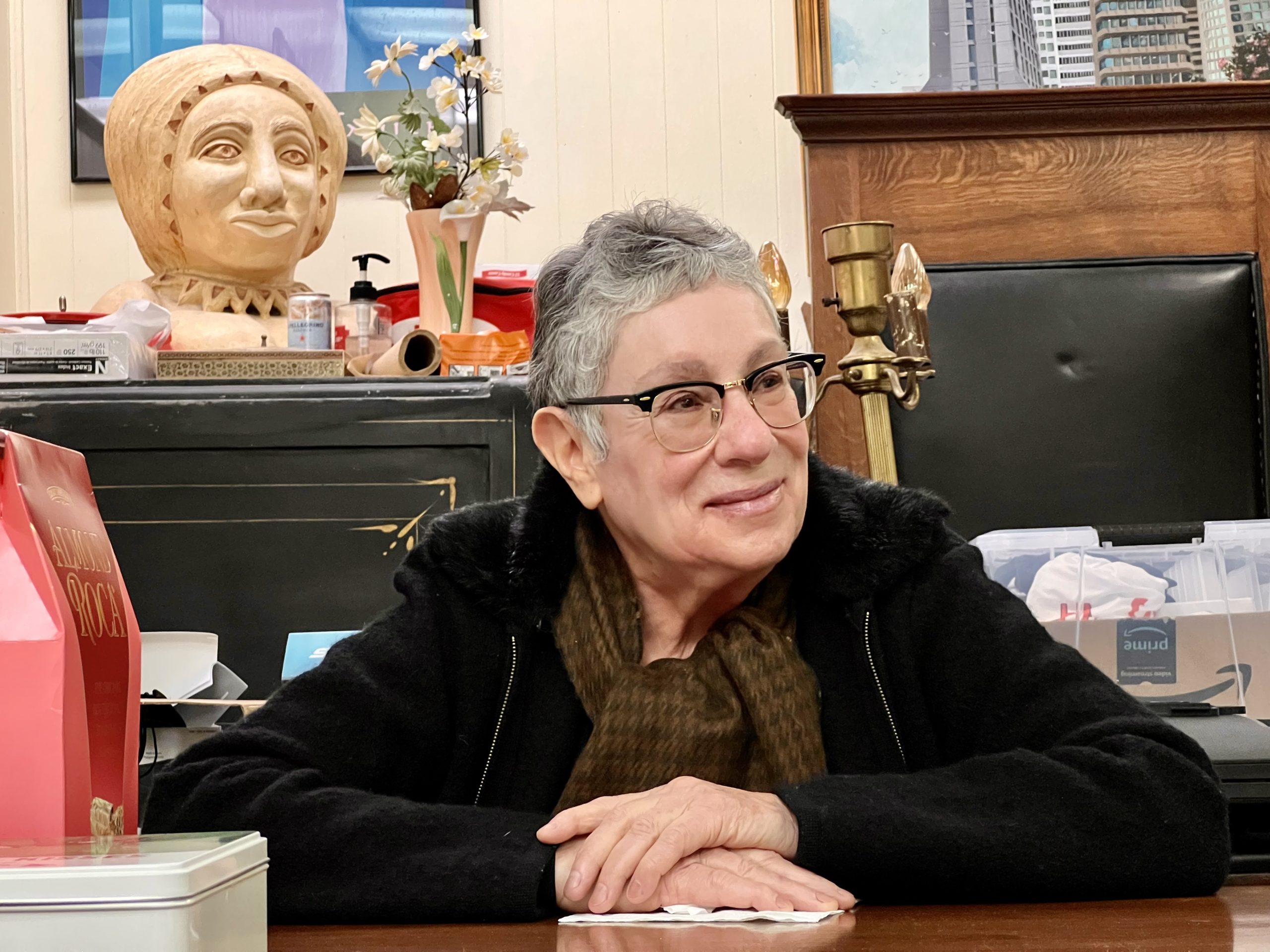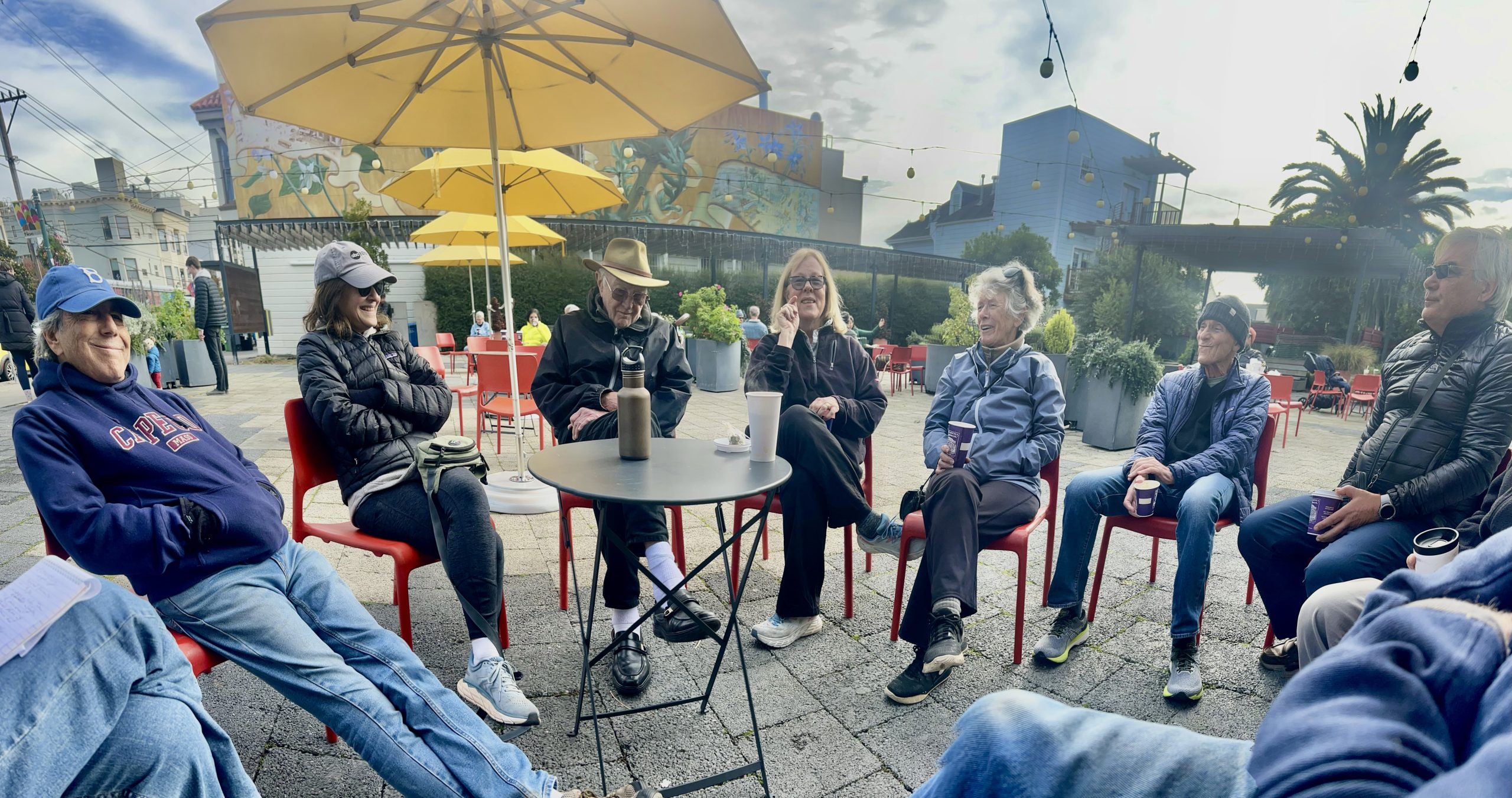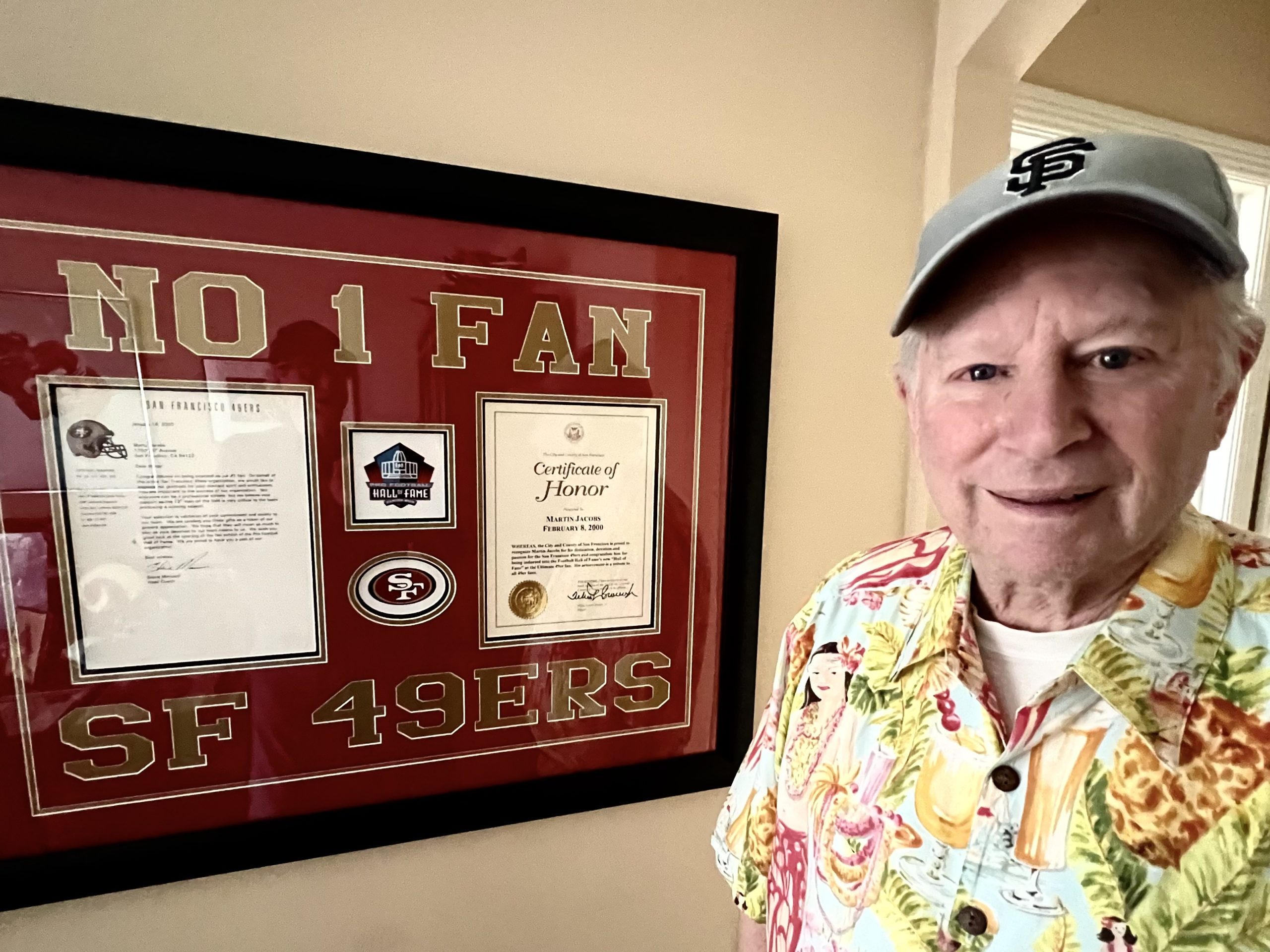Historic center keeping records and creating community for the Irish-born, Irish-Americans and the Irish-at-heart for last 45 years
In her latest YouTube video, Jennifer Drennan, wearing protective gloves, holds up an original program from the 1898 Irish Fair, held at the Mechanic’s Pavilion at the San Francisco Civic Center.
This is the kind of memorabilia and Irish history found in the J. Patrick Dowling Library at the “United Irish Cultural Center of California” on 45th Avenue, three blocks from Ocean Beach.
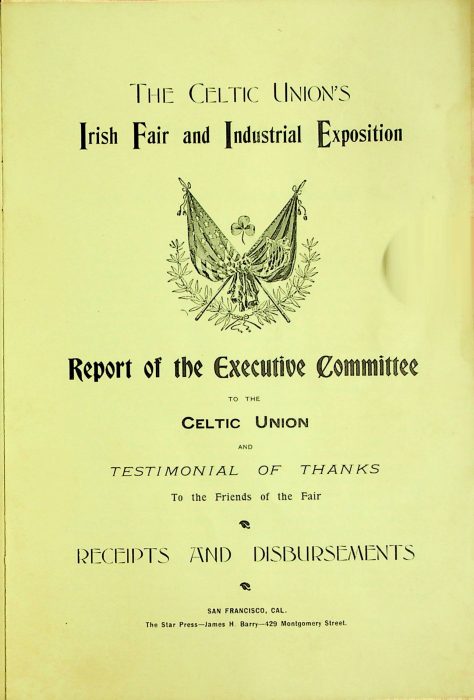
“The Irish Fair was a major fundraising event for the Celtic Union,” the literary society founded in 1853 to publish Irish history, said Drennan. The last live Irish Fair in California was held in 2019 in Irvine; last year’s was virtual.
Drennan is the first paid librarian in about 10 years at what was the first all-Irish library in the country. She volunteered for two years before the board decided to make it a part-time position. The job is a natural fit. She’s a sixth-generation Californian with distant Irish roots whose family has been socializing at the center for years. “My ancestors are from County Galway, maybe the city of Belfast,” she said. “My husband has been coming here since he was a kid and I’ve been part of UICC for 22 years. Now, my 12-year-old son is part of it, too.”
Library work is a second career for Drennan. Her first was gemologist. But she uses many of the same skills: inventory management, customer service, merchandising and making presentations.
Drennan went back to school after her place of employment, the Union Street Goldsmith, closed in 2017. “With career counseling, I decided on studying information technology at City College San Francisco,” said Drennan, now 55. Having already earned a bachelor’s degree in history at University of the Pacific in Stockton, Drennan, a big reader, was drawn to library science.
Keeping the culture alive
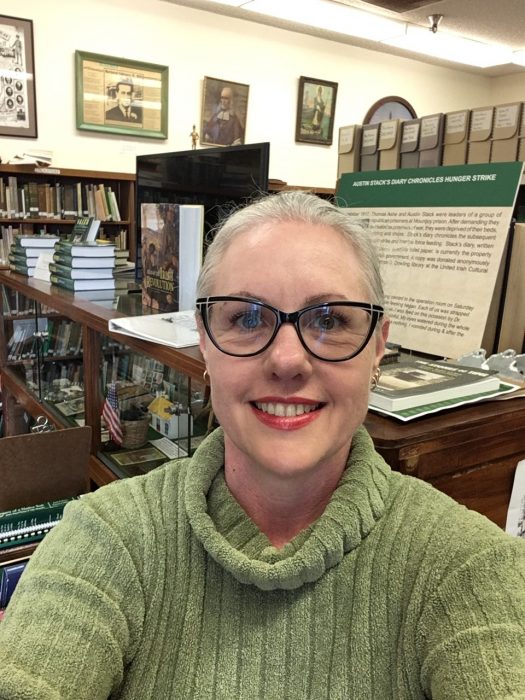
“I’ve been in libraries since I was a kid, spending time in the county library after school waiting for my Mom. I volunteered in my high school library,” she said.
Graduating magna cum laude with an Associate of Science degree in Library Information Technology, Drennan was hired as a part-time library aide in the Fernando Rivera Middle School in Daly City, where she works five days a week.
She educates the sixth- to eighth-graders in media literacy. “I assist the librarian in curating themed displays such as Banned Books week, Women’s History month, and I support her curriculum,” said Drennan, who is also studying online for a master’s in library science at San Jose State University.
The Dowling library closed last year due to Covid, but she’s been there three to four afternoons a week cataloguing the collection and digitizing it – to preserve aging paper as well as making everything accessible online. Besides, being there makes her happy, she said. It’s her extended family. “There are the Irish-born and the Irish-Americans and then the Irish-at-heart. Everyone is welcome.”
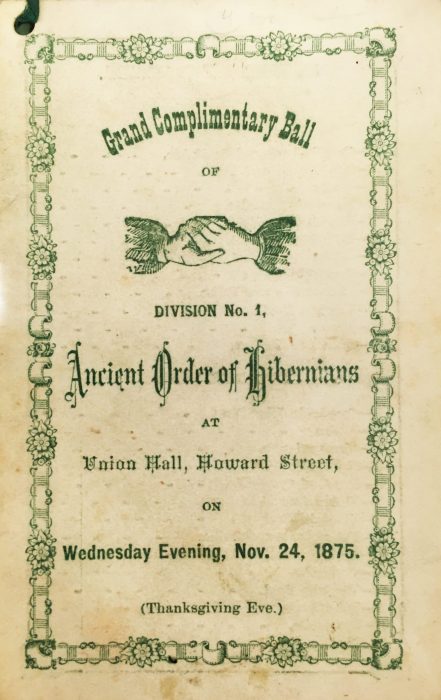
From the time they settled in San Francisco, the Irish created organizations to preserve and promote their culture. Among them were The Ancient Order of Hibernians and The Knights of the Red Branch, known and loved for its dances, music, and wild nights and managing to remain open during Prohibition. (The Ancient Order of Hibernians is still active in the Bay Area, and the Knights of the Red Branch, whose 1133 Mission Street hall was destroyed by fire in 2007, is a much smaller group today.)
Over the years, the San Francisco Irish – their social clubs and benevolent and protective societies – met in several different halls. The wooden buildings housing these organizations burned easily and had to be rebuilt. That history is chronicled in the UICC’s 45th anniversary video, “45 on 45 – The Irish Halls of San Francisco from 1850 to the UICC in 2020.”
In the early 1970s, the San Francisco Irish, who longed for a permanent place to meet, socialize, and share their culture, got together to construct the current center. It was built entirely by volunteer labor and community contributions, Drennan said.
Opened in 1975, the UICC hosts events from weddings to birthday parties to comedy shows and concerts. It houses meetings rooms, a bar and restaurant. and since Covid-19, there’s outside dining on weekends under a big tent where patrons enjoy live Irish music and food favorites like Shepard’s Pie and Irish sausage with grilled onions.
500 books in the Irish language
The library, founded by Patrick Dowling of Ireland’s County Laois, is the jewel of the center. A non-circulating library of special collections, it holds approximately 6,000 titles – books, memorabilia, artifacts and organizational records related to Ireland, the Irish-American experience and Irish history in the Bay Area. “We have 500 books in the Irish language, and a range of Irish authors and writers on Irish subjects,” Drennan said.
Dowling emigrated to San Francisco in 1926 and established the library in his 70s, after a successful career in business.
“Dowling traveled throughout Ireland and the U.S. soliciting donations for the library, which is still largely donor-supported, Drennan said. Two of the library’s many resources on Irish America were written by Dowling: “California, the Irish Dream” (1988) and “Irish Californians” (1998).
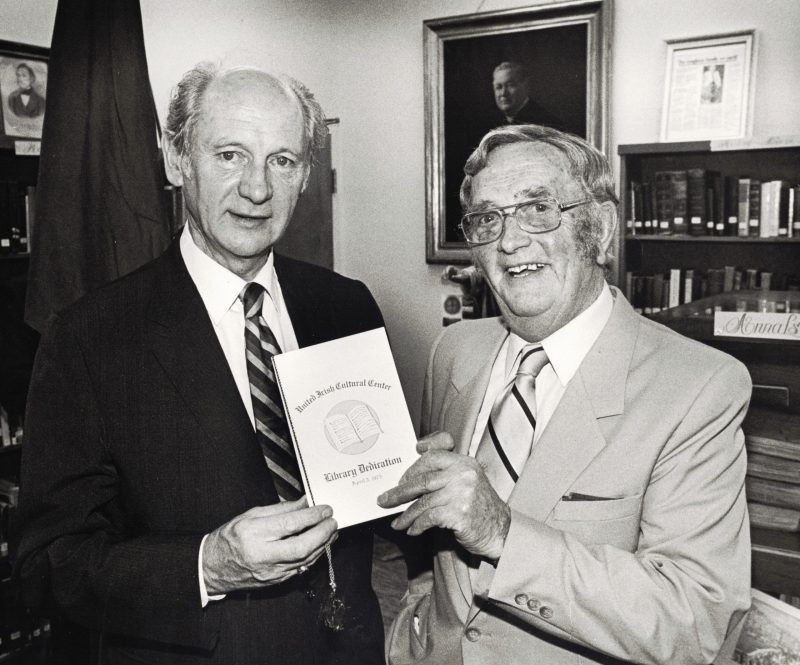
Other materials cover a wide range of topics: archaeology, architecture, art, biography, cooking, crafts, genealogy, history (ancient and modern), immigration, literature (novels, plays and short stories), music (including music scores), mythology and folklore, religion, sports, and travel.
Dowling also gathered newspapers and periodicals from many of the Irish counties. “People, homesick for the old country, really appreciated knowing what was going on in Ireland,” Drennan said. Space today is limited, but the library still subscribes to some Irish periodicals and journals such as “The Irish Herald,” published monthly in Burlingame and “Treoir,” the magazine of Comhaltas, which promotes traditional Irish music and culture around the world.
Historians and literary researchers often visited the library. “Some of our titles, although available in Ireland and Scotland, are quite rare in the U.S.,” said Drennan. “We get our share of known people visiting also, such as the local writer and teacher Rose Murphy and Beto O’Rouke, when he held a town hall meeting at the center. Also, politicians, presidents of Ireland, even House Speaker Tip O’Neill, back in the day.”
Other memorabilia from the 1898 Irish Fair include social and picnic flyers from the Knights of the Red Branch celebration of Robert Emmett, an Irish Nationalist patriot, orator and rebel in the late 1700s, and copies of “The Leader,” a magazine featuring articles by the Rev. Peter Yorke, an Irish Catholic priest, noted Irish Republican and San Francisco labor activist.
They also have a John F. Kennedy flyer from his run for U.S. Senate. “When Kennedy, an Irish-Catholic, was elected President, the Irish here finally felt part of the American experience,” Drennan said.
Some records lost in ’06 quake
Many people have used the Patrick J. Dowling Library to trace their genealogy, said Drennan, although many records “were lost in the 1906 earthquake and when the Irish social clubs and societies’ wooden buildings burned.” She hasn’t been able to trace her own family history. “Sadly, the records my paternal grandmother started collecting when I was young went missing.”
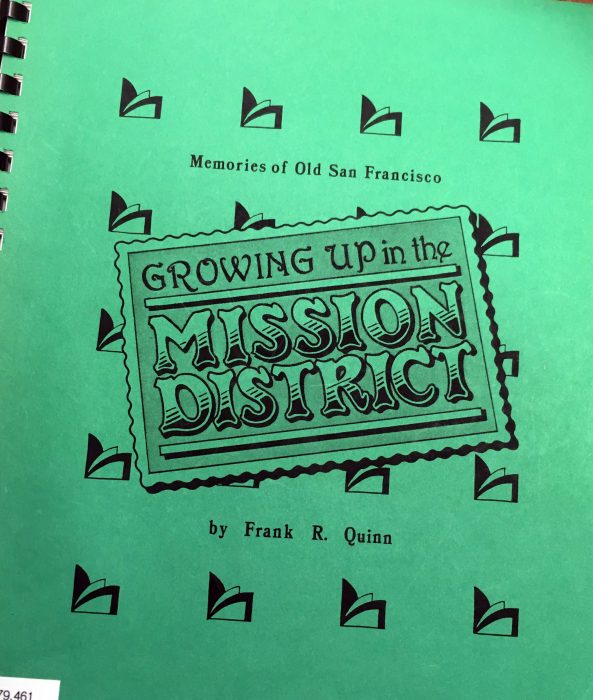
Before Covid-19, the library was open three days a week. It could be a busy place. “Members of the UICC could take a book to the pub and read while enjoying tea or a pint,” she recalled. “Now, it’s quiet.”
She misses the interactions with library users and volunteers, most of whom have some Irish ancestry as well as backgrounds in academia, library science or simply a love of information and helping people, Drennan said. “We also have high school student volunteers who blend their interest in their Irish heritage with fulfilling their schools’ requirement for community involvement.”
Then there were the eighth graders and seniors working on essays for their applications for the Leo Walsh Scholarship, which since 1994 has been awarded to more than 500 students. She guided them on their research. Now, she helps via email.
But being alone at the library is compensated by having so much information at her fingertips. She likes to peruse the advertisements and gossip in the old newspapers, the descriptions of people and events, and the interesting notes in some of the early 20th century ledger books.
“Right now, I like a 1883 edition of the History of Ireland and the folktales in our juvenile collection,” she said. “I want to read everything!”



